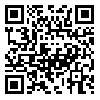مجله رویش روانشناسی از دادن گواهیهای کاغذی معذور است. لطفا تقاضا نکنید. همه گواهی ها در صفحه شخصی کاربران موجود است.
year 14, Issue 4 (sumer 2025 2025)
Rooyesh 2025, 14(4): 83-92 |
Back to browse issues page
Download citation:
BibTeX | RIS | EndNote | Medlars | ProCite | Reference Manager | RefWorks
Send citation to:



BibTeX | RIS | EndNote | Medlars | ProCite | Reference Manager | RefWorks
Send citation to:
Atashzar B, Shafiabadi A, Hamidipour R. (2025). Predicting Academic Resilience based on Media Literacy, Innovative Thinking and Regulation of Academic Emotions. Rooyesh. 14(4), 83-92.
URL: http://frooyesh.ir/article-1-5800-en.html
URL: http://frooyesh.ir/article-1-5800-en.html
1- Ph.D student in Counseling, Department Of Counseling, Faculty Of Education And Psychology, Islamic Azad University, Tehran, Iran.
2- Professor, Department of Counseling, Tehran Branch, Allameh Tabataba'i University, Tehran, Iran. ,ashafiabadi@gmail.com
3- Assistant Professor, Department Of Counseling, Faculty Of Education And Psychology, Farhangian University, Tehran, Iran.
2- Professor, Department of Counseling, Tehran Branch, Allameh Tabataba'i University, Tehran, Iran. ,
3- Assistant Professor, Department Of Counseling, Faculty Of Education And Psychology, Farhangian University, Tehran, Iran.
Abstract: (834 Views)
The purpose of the present study was to predict academic resilience based on media literacy, innovative thinking, and academic emotion regulation. The present research method was descriptive-correlational. The statistical population included all the students of the universities of Kermanshah in the academic year 1401-1400, with a population of 34676 people, and 400 people were selected using random cluster sampling. The tools of this research included Philosophical Media Literacy Questionnaires (2013, MLQ), innovative thinking of Maad et al. (2021, ITQ), Pekrun et al. (2002, AEQ), and academic resilience of Samuels (2004, ARQ). The research analysis method was Pearson correlation and regression analysis using the same time method. The findings showed that there is a significant relationship between media literacy, innovative thinking, and regulation of academic emotions with academic resilience (p<0.01). Also, the results of the regression analysis showed that media literacy, innovative thinking, and regulation of academic emotions explain 0.33, 0.49, and 0.18 percent of the variance of academic resilience, respectively (p<0.01). According to the findings of the research, it can be concluded that the regulation of academic emotions, media literacy, and innovative thinking play an essential role in predicting academic resilience in students.
Keywords: Academic Resilience, Innovative Thinking, Regulation of Academic Emotions, Media Literacy.
Type of Article: Research |
Subject:
Educational Psychology
Received: 2024/11/15 | Accepted: 2024/12/11 | ePublished: 2025/07/1
Received: 2024/11/15 | Accepted: 2024/12/11 | ePublished: 2025/07/1
Send email to the article author
| Rights and permissions | |
 |
This work is licensed under a Creative Commons Attribution-NonCommercial 4.0 International License. |





